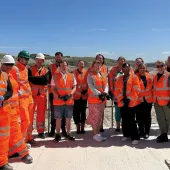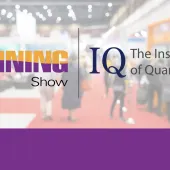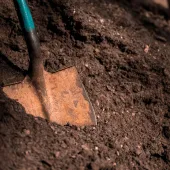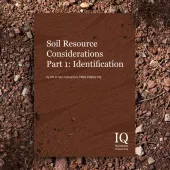IQ Quarry Question Time returns

High-level panel debates ‘worker engagement’ at University of Derby’s Enterprise Centre
QUARRY Question Time returned to the Derbyshire branch of the Institute of Quarrying on Thursday 5 February with a panel consisting of: Martin Riley, newly appointed senior vice-president of Tarmac; Tim Hall, director of Breedon Aggregates; Ashley Haslett, head of operations and SHEAQ with EPC-UK; Cath Pickett, HSE Inspector of Quarries (Wales & Midlands); and Prof. Richard Hall, director of research, innovation & impact at the University of Derby.
The event was held at the University of Derby’s Enterprise Centre and hosted by its Centre for Mineral Products. Chairing the proceedings was Phil James, executive director of the Institute of Quarrying.
The subject for this year’s Question Time was ‘worker involvement’. What questioners wanted to know was how to get the best out of their employees. The answers were not entirely unexpected – basically, treat them right.
For Tim Hall, job security was a way of avoiding ‘clock riders’ and he said people on monthly salaries worked fewer hours but achieved as much as those on hourly pay looking for overtime. Ashley Haslett thought the demarcation between hourly pay and monthly salaries belonged to a different age. Martin Riley said investing in people was more important than investing in yellow iron.
The panel agreed that bonuses relating to specified goals, rather than simply as a way of topping up pay, could be effective, although Richard Hall pointed out that money was not everything or he would not work in academia. He also said that in a rapidly changing world, skills need to be kept up to date and have to be transferable, because jobs are no longer guaranteed for life.
Not everything is easily tested by an exam, though. The industry often says it wants people with the right attitude. ‘A lot of these things are off-piste,’ he said. ‘We don’t measure them but we all value them. Maybe there is something we could do with the industry to look at that.’ Martin Riley agreed that attitudes are important. ‘You can’t afford to have ‘terrorists’ in your organization,’ he said.
Listening to employees is important, the panel agreed – which means listening to what they are actually saying rather than what you want them to be saying. ‘It’s an art,’ said Martin Riley. Tarmac have included a section called ‘Make Your Mark’ on their website where people talk about what they have achieved with the company in their own words.
Getting that message out – that the minerals extraction industry offers good careers opportunities – will be vital to the sustainability of the industry. The workforce is ageing and its knowledge and skills are in danger of being lost before they can be transferred to the next generation.
For Cath Pickett there was an easy answer to the question of how to involve people when it comes to health and safety – Regulation 40. If companies asked her what they could do to engage the workforce, ‘that’s the answer,’ she said.









